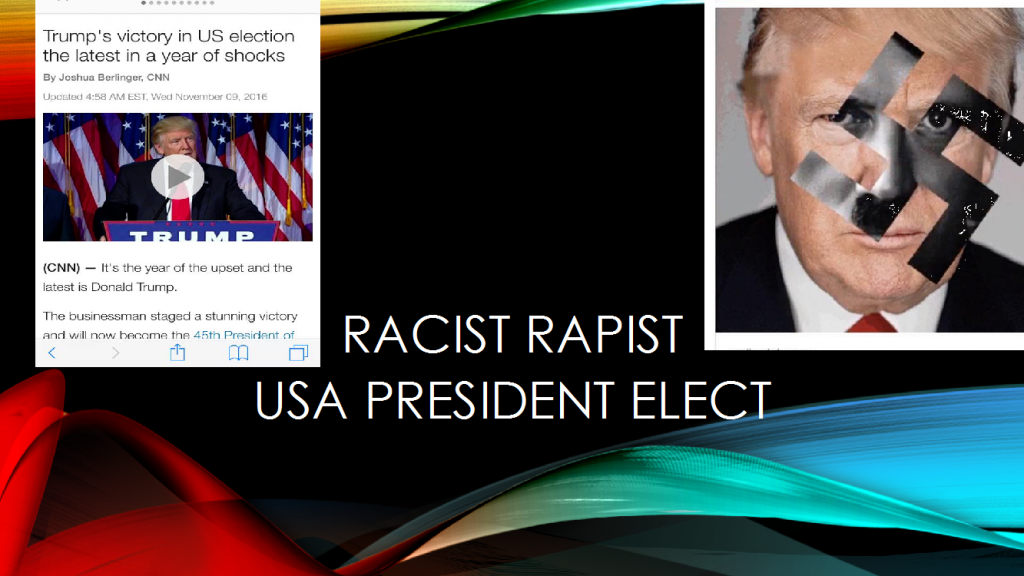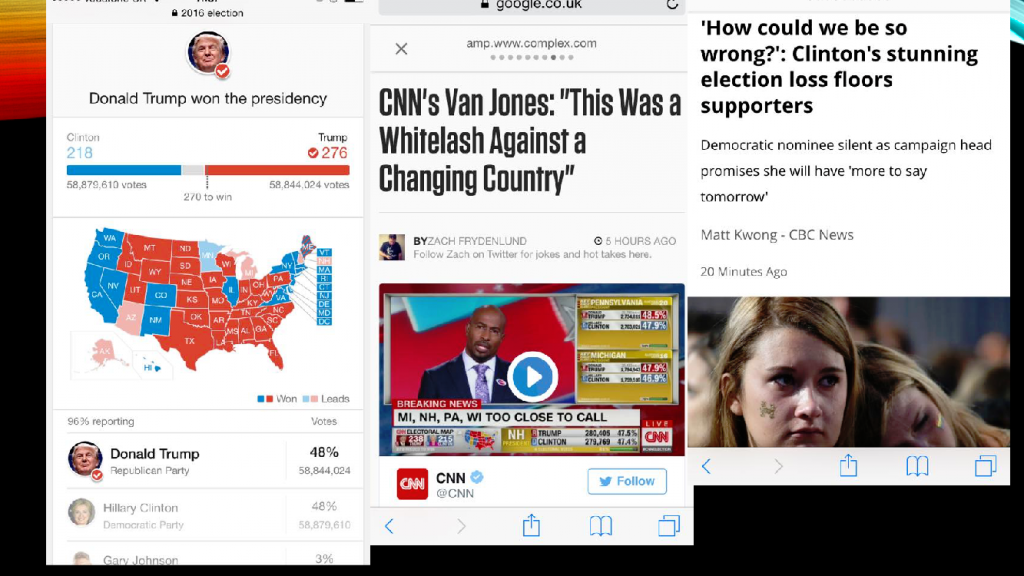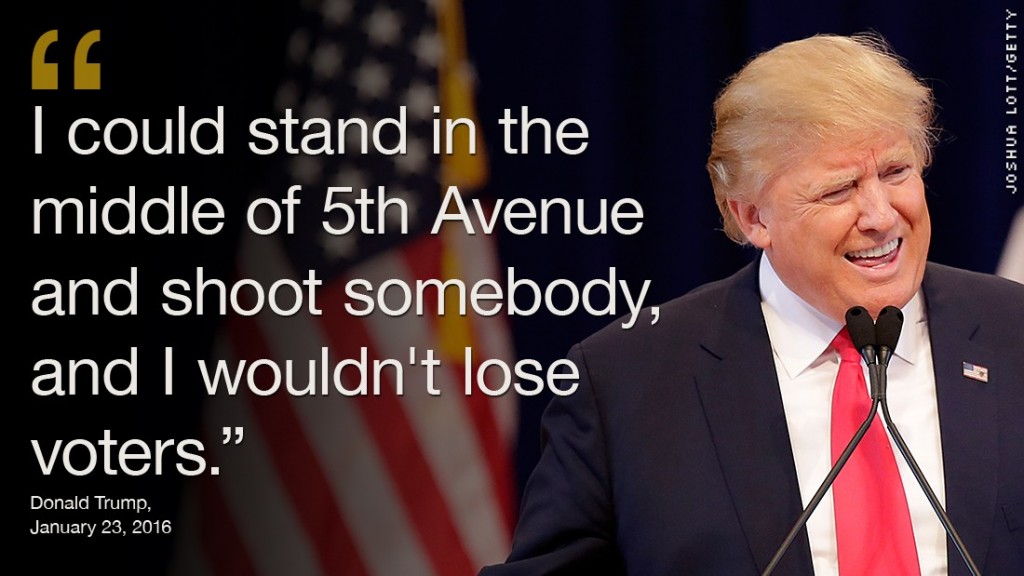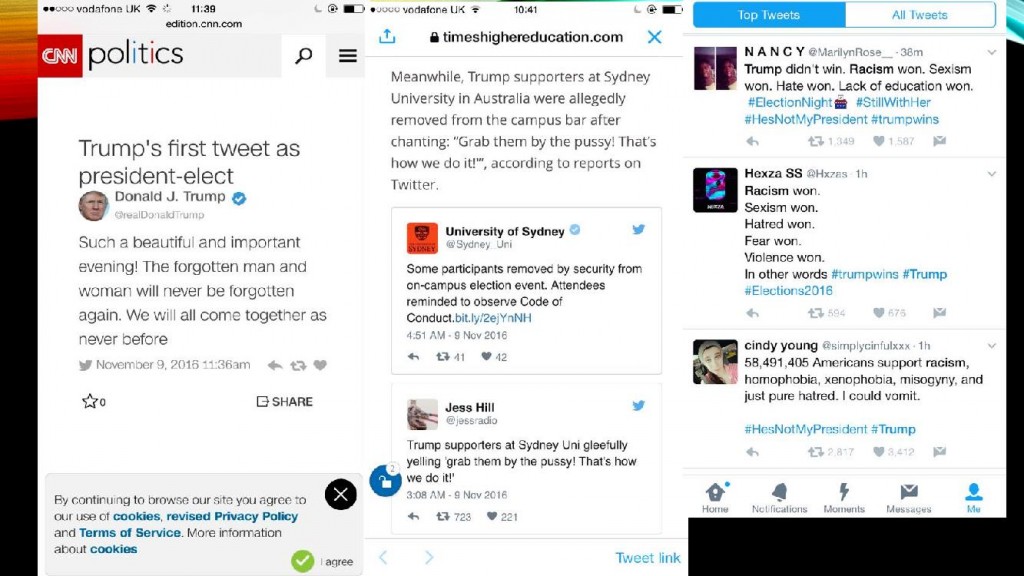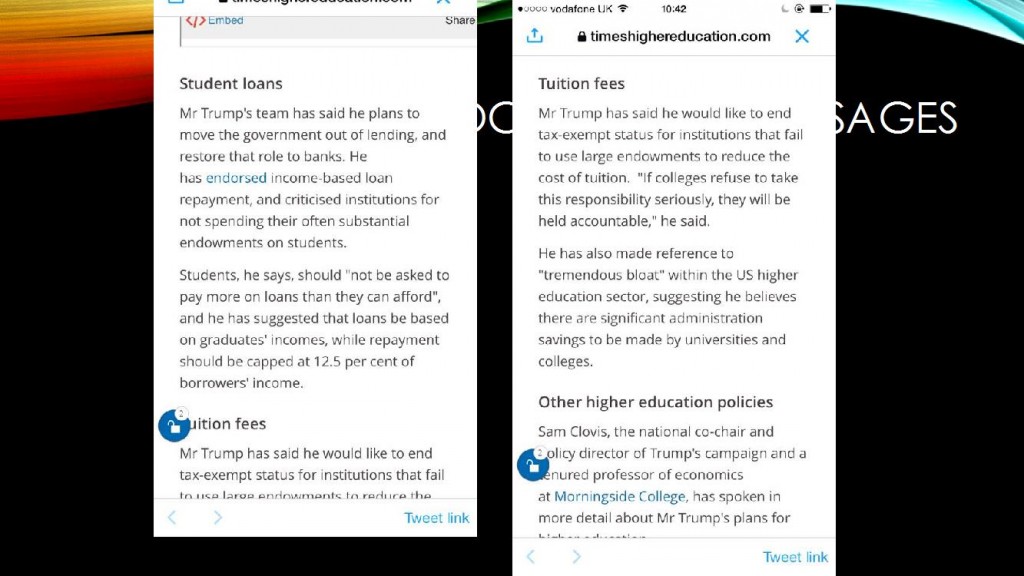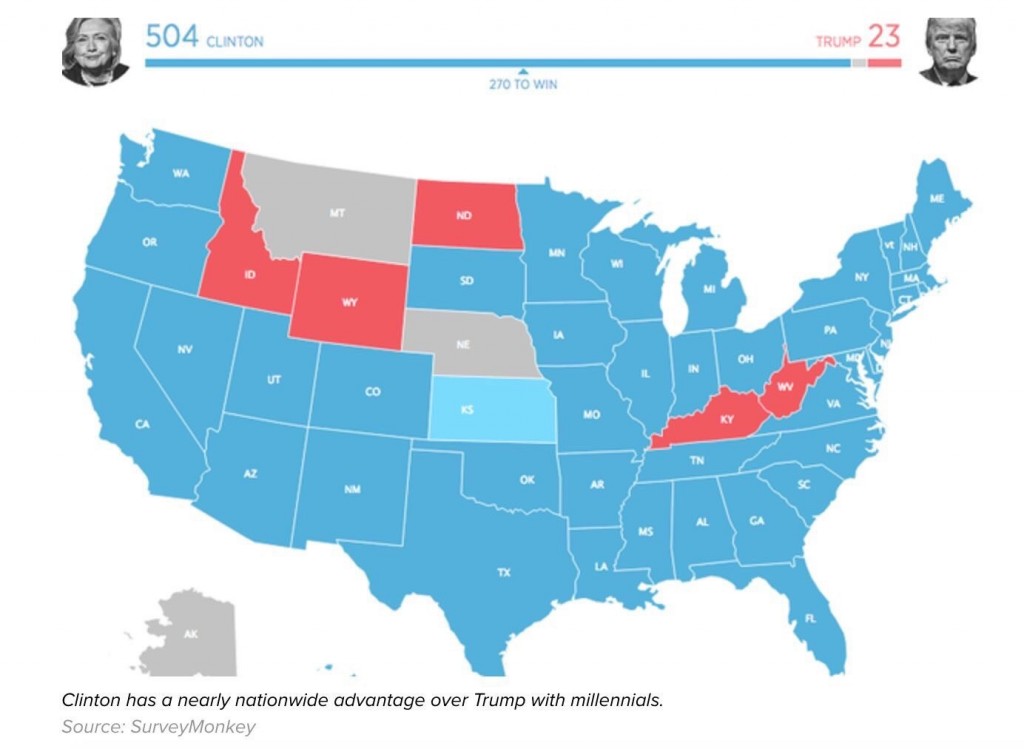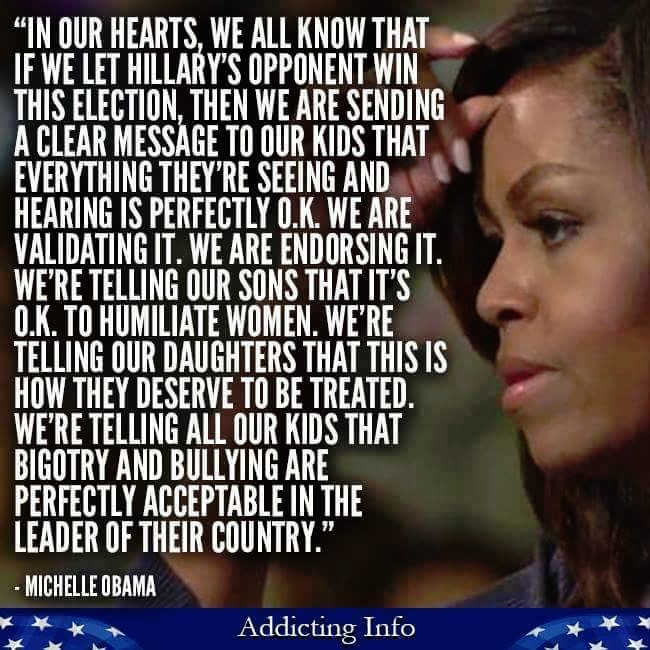Calling out Trump Pedagogy: Turning the 2016 USA election into a teachable moment
Jessica Ringrose and Victoria Showunmi, UCL Institute of Education
Many teachers at schools and universities internationally have been asking how to discuss the 2016 USA elections with children, young people and university students as they head back to their teaching and learning work in the aftermath of what has been called the most ‘divisive’ election in USA history.
Last night in the wake of the 2016 USA election results Victoria Shoumni and Jessica Ringrose of the UCL Institute of Education and Gender and Education Association Executive Members were presented with the timely opportunity to re-tune their planned MA lecture in Sociology of Education on “Racism and Black Feminist Intersectionality” into a discussion about the world events of Donald Trump elected as USA President. It is probably already clear that given the lecture was on Black Feminism and the contributions to sociological thinking from Intersectional scholars such as Kimberly Crenshaw and Patricia Hill Collins, we would be addressing the racism and misogyny and also the deep class cleavages that became the focal points of American culture through the events of the run for presidency the battle between Hilary Clinton and Donald Trump and finally Trumps ‘win’ of the election. We acknowledge our great privilege to be working in a university context with highly educated young people, but also note that these students come from a wide variety of backgrounds in the educational sector both regionally in the UK and internationally with members of the module from Columbia, Argentina, Chile, Hong Kong, China, Japan, South Korea, Malaysia, Canada and USA.
Here are some highlights of our session
We opened the session discussing some of the hateful language championed by what we call “Trump Pedagogy” – that is a form of popular speech that is supposed to be hard hitting, honest and reflective of the ‘common interest’, but is actually hate-speech and a rejection of global equality initiatives and human rights. It is pedagogical therefore in teaching and legitimizing hate. Recall, Trump has called women ‘nasty’, ‘bitches’ and boasted about ‘grabbing them by the pussy’, said African Americans were “lazy fools only good at eating, lovemaking and thuggery” and called Mexican’s “rapists”, Chinese “cheats” and all Muslims “potential threats”, with the list going on and on.
In counterpoint we argued it is important to clarify Trump’s identity defining him as a RACIST RAPIST and to have detailed discussions about how to make sense of the popular embrace of Trump despite of, or indeed because of, these attributes.
The early coverage of Trump’s win was based on the idea that the ‘rust belt’ of disenfranchised voters had voted with their ignorance for Trump, similar to how working class Britain had made a ‘protest vote’ with Brexit. This was disputed, however, with the evidence that middle class white Americans (men and women) had voted to secure their privilege, which commentators were calling a ‘whitelash’ (white backlash).
Social media data showed that Black women in America were the heaviest supporters of Hillary, a White woman, and how we need to address the intersections of racism, sexism and class to understand how some women will identify with a white male rapist before their own ‘sex’ which complicates the very idea of women’s natural commonality and shared sex, given identity and position is always organised through class, race, gender and locations and relative degrees of privilege and oppression defined through access to structural power.

Why is it is so common for people to say that one aspect of identity is more important than the other – for example, in the below Tweet that argues America is “more sexist than racist”. Can you actually tease apart these dimensions in the lived experience of Black women?
Next, in true feminist pedagogical fashion, we all discussed out own positionality and social location in relation to unfolding election events and how it was shrouded in racism.
Going around the room to gather reflections on the election it was striking that a group of white USA women in the room were crying. We had a useful discussion of whether they felt they must act as the affective containers for white grief and despair crying on cue as part of ideal white femininity, something that has long been problematic in the feminist movement. We also questioned are white women the ones who are sanctioned or legitimized to cry? In counterpoint, we discussed the figure of the Black woman who is angry yet ‘resilient’ and how this related to discussions of character education in British schools – how can we bottle up some of the courage and resilience of the ‘minorities’ who do well in the face of disparity and profit from this in UK schooling market?
The only Black USA woman in the room spoke passionately, declaring that Trump ran the election like a reality TV show, claiming she knew since Hillary winning the Democrat lead that they couldn’t win because she was associated with ‘establishment’ and she told her Black friends ‘not to vote’. A British white man noted that ‘the system is broken’ in the vein of the ‘broken Britain’ trope suggesting everything is corrupt and today was no different than yesterday; and although Trump was terrible, it wasn’t about an individual man but a failing system. A white British woman continued by saying, you couldn’t now turn on the voters as they had exercised their ‘democratic rights’.
We discussed whether we are actually in a new paradigm or era of unabashed racism and sexism and how Trump Pedagogy – hate speech against ‘women’ and minorities’ pedaled by Trump worked to hide class cleavages in USA (and his own ivy league education) in very clever ways.
We also wondered if we could limit a discussion of democracy to voting in a two party system where the popular vote doesn’t determine presidency. Next we wondered what democracy and ‘choice’ can mean in a context of mass media conditioning or what Massumi calls ‘affective modulation’ where media loops of Trumps angry face work on an endless repetitive cycle, affirming the apt observation by one student that reality TV had become real life. That Trump’s main talent is unrelenting self-marketing performance, a key badge of successful ‘winners’ to use his term in a neo-liberal age is clear. Indeed this is something Trump was very well aware of in orchestrating the media and voters over time:
We explored what Sampson has called mediated viral contagion (Sampson, 2012) and how repetition worked to legitimize hate through what we are calling ‘Trump Pedagogy’. For instance, immediate behavioral contagion was evident such as young men at the university of Sydney who chanted ‘grab them by the pussy’ on campus:
Students worried how rape culture would be sustained and flourish further than even before in a context where unbridled misogyny and performances of aggressive, violent masculinity are rewarded and the man who said of women he would ‘grab them by their pussy’s’ was now the leader of the ‘free world’?!
Because our teaching moment was in sociology of education in a University MA module we also raised the specific issue of Trump’s views on higher education, noting Trump’s plans for deregulation of student loans away from government inputs putting lending more fully into the hands of banks (because that worked so well in the housing market?); and we noted Trumps aversion to a ‘tremendous bloat’ at the level of university administration. We wondered what exactly that meant, surmising it was likely about further reducing support services and resources for students and staff in the neo-liberal university where profit is increasingly accrued to the center with less staff taxed with ever heavier workloads, and ever fewer faculty in secure tenured positions and ever more university workers faced with dramatically increased precarity in the form of contract and adjunct work with little hope for other routes to participate in academia.
Returning to the pedagogical and educational issue of how to discuss these issues with young adults, teenagers and children we considered perhaps the most hopeful aspect of the election was the age demographic of under 25’s voting overwhelmingly in favor of Hillary Clinton.
Overall, then, we would say we need to encourage discussion of young people’s own views and standpoints, and to not shy away from the fact that powerful leaders may well be the most morally and materially corrupt of all citizens, to turn the logic of who leads in our political systems under critique and explanation, rather than sheltering young people from an analysis of institutionalized power and inequality. Indeed we would encourage all educators to enable debate over theses issues so that young people can feel more empowered to engage in the political process defined not only through party system elections but everyday relationships in their lives including their participation in various types of educational spaces. This is why if it turns into simplistic hostility between different supporters or camps, we need to keep reminding young people that respect, consent and consideration are tools of communication that they need to champion even if this seems hypocritical and paradoxical in the current moment where ‘punch em’ in the face’ mentality is being rewarded. Just because something has won out in the popular vote doesn’t make it right. Indeed the first image that appeared on social media above – a gif of a swastika swirling across Trump’s face entangling his face with Hitler’s is a good way to think historically about moral crisis, and to renew debates about the meanings of terms like ‘fascism’ and whether they still hold explanatory value or not.
We concluded our session by invoking the feminist slogan the ‘the personal is political’ and the black feminist mantra ‘the masters tools will never dismantle the masters’ house’ (Audre Lorde). This was accompanied by images and quotes from Michelle Obama whose confrontation of Trump’s sexual violence and support of ‘we will rise’ campaign about the power of education to rethink gendered power relations has resonated so powerfully for so many.


